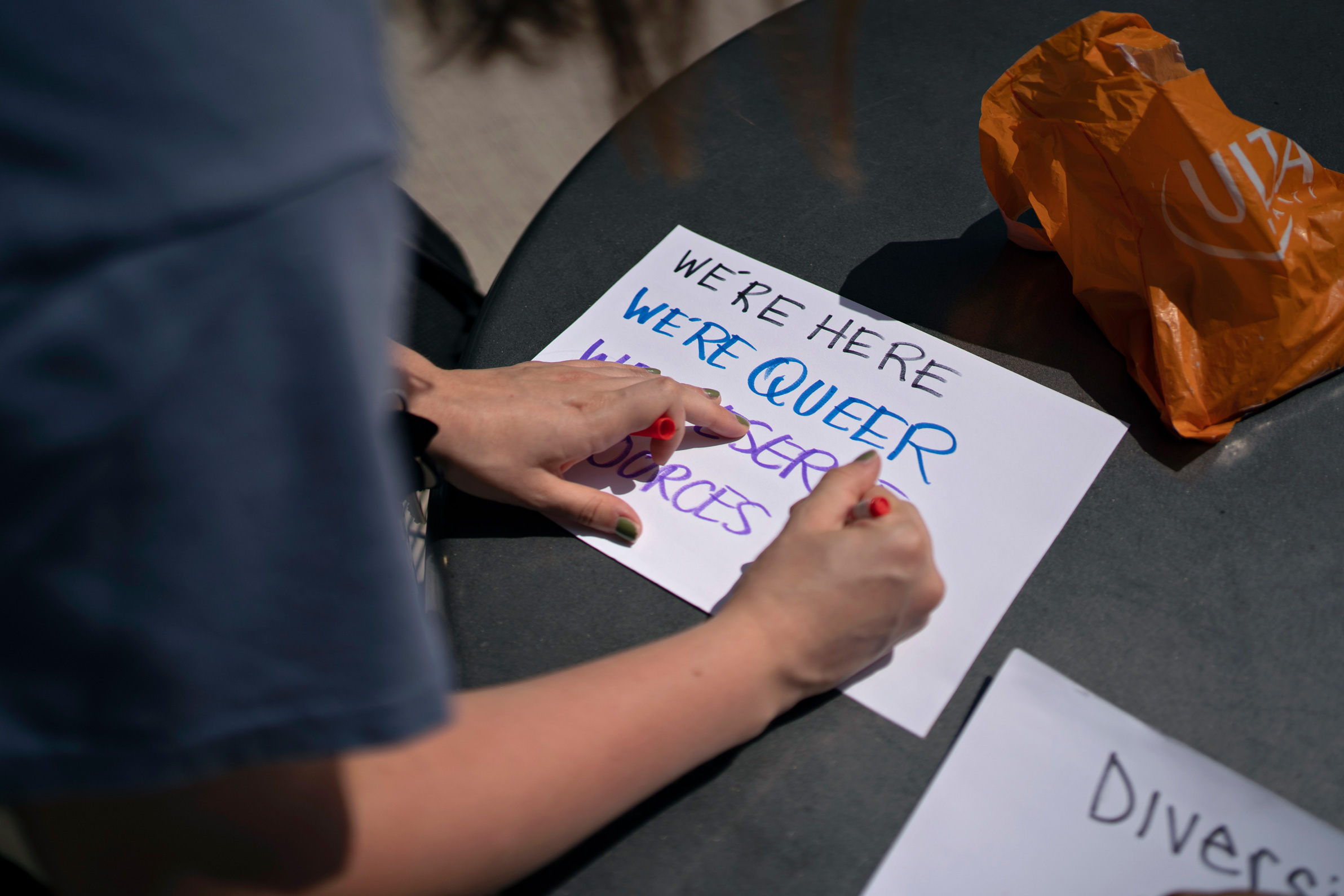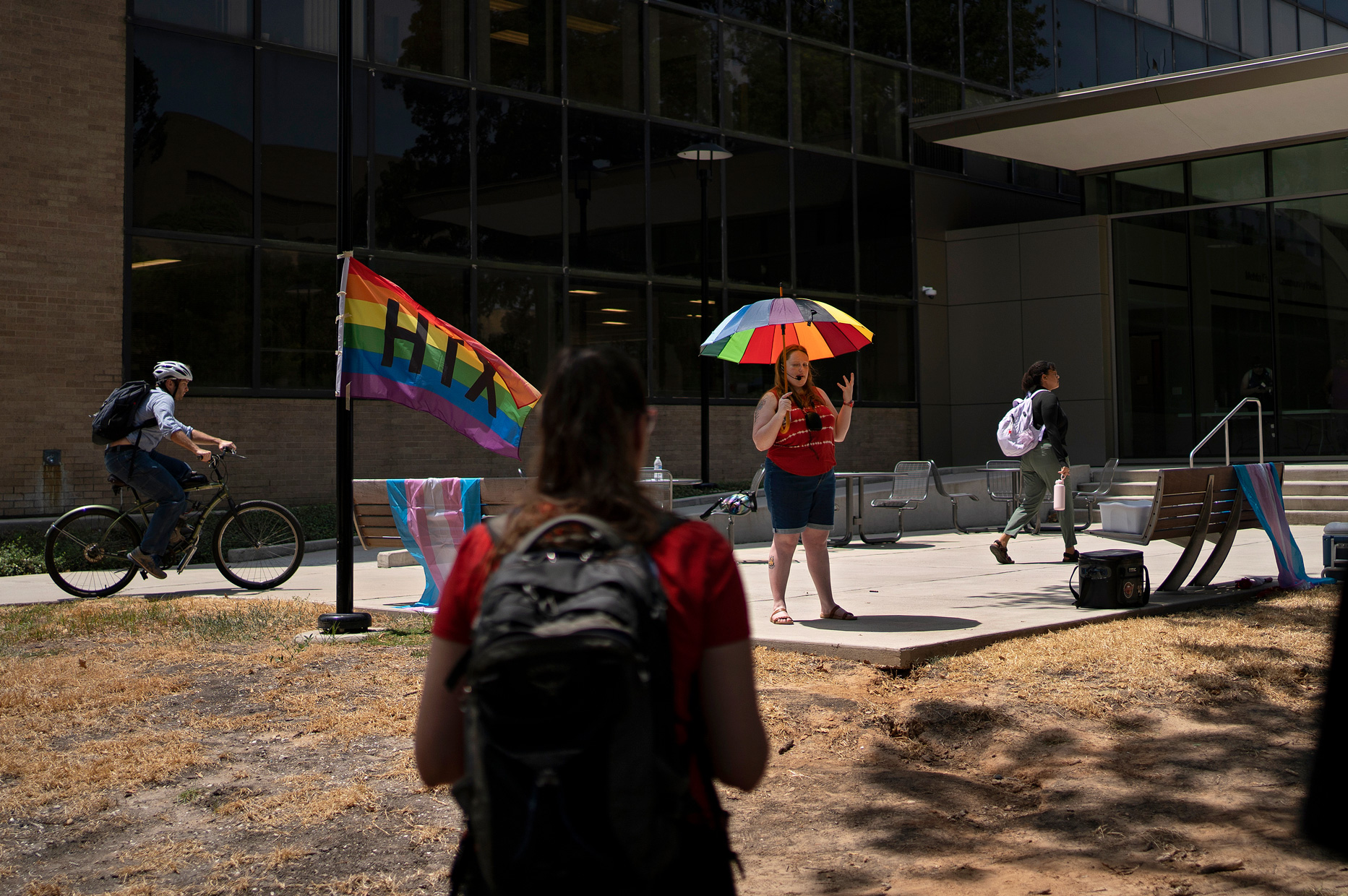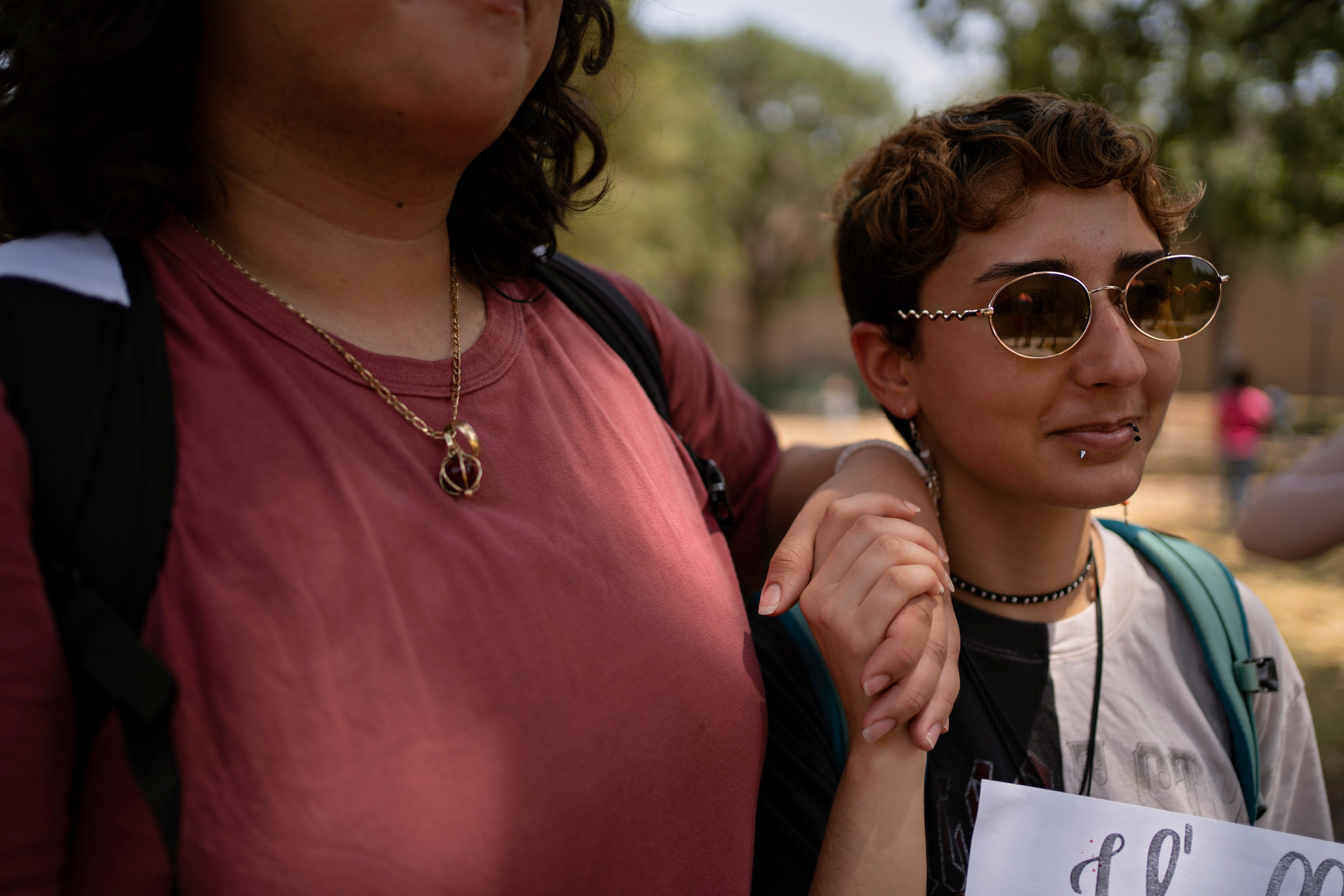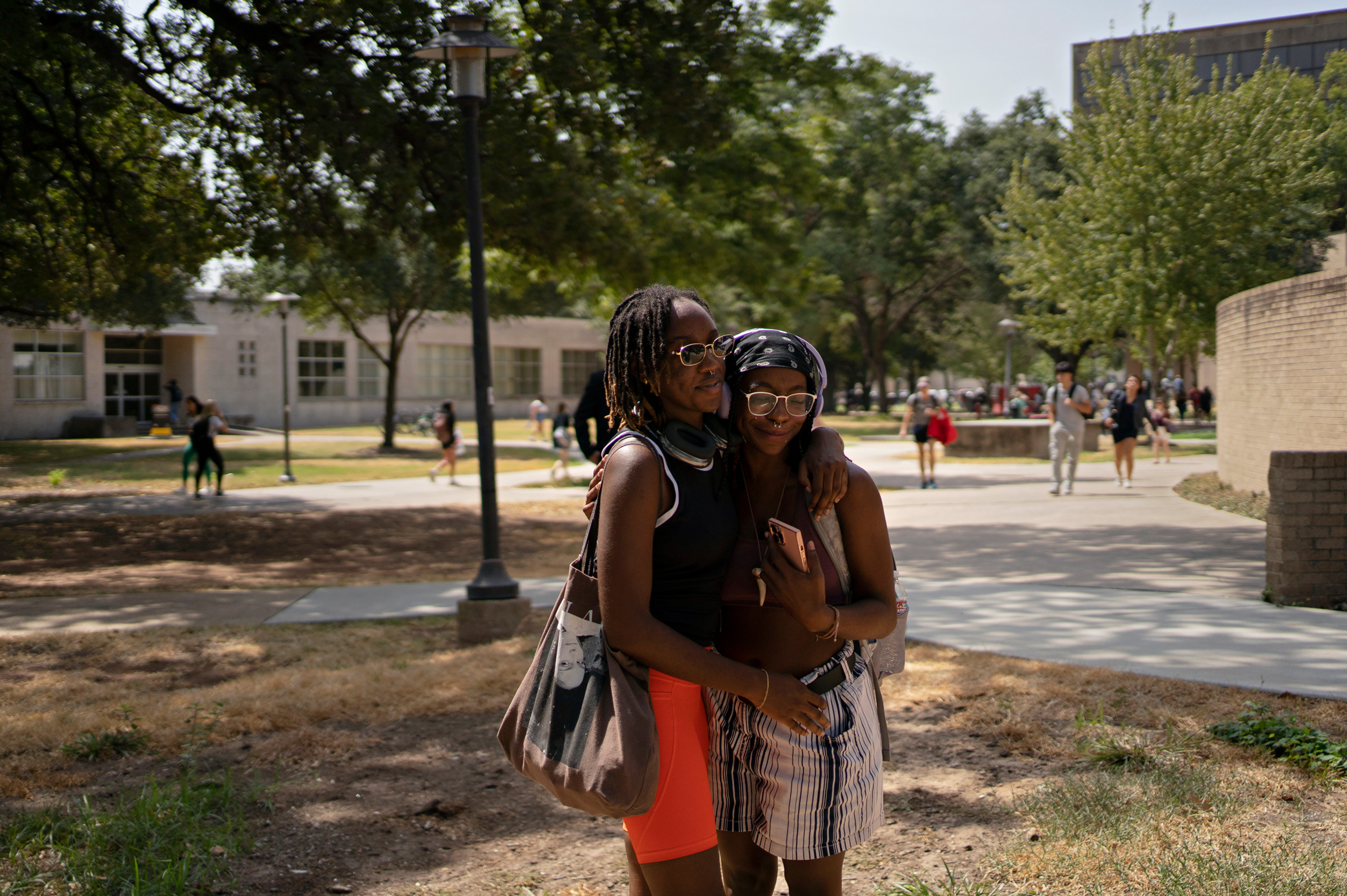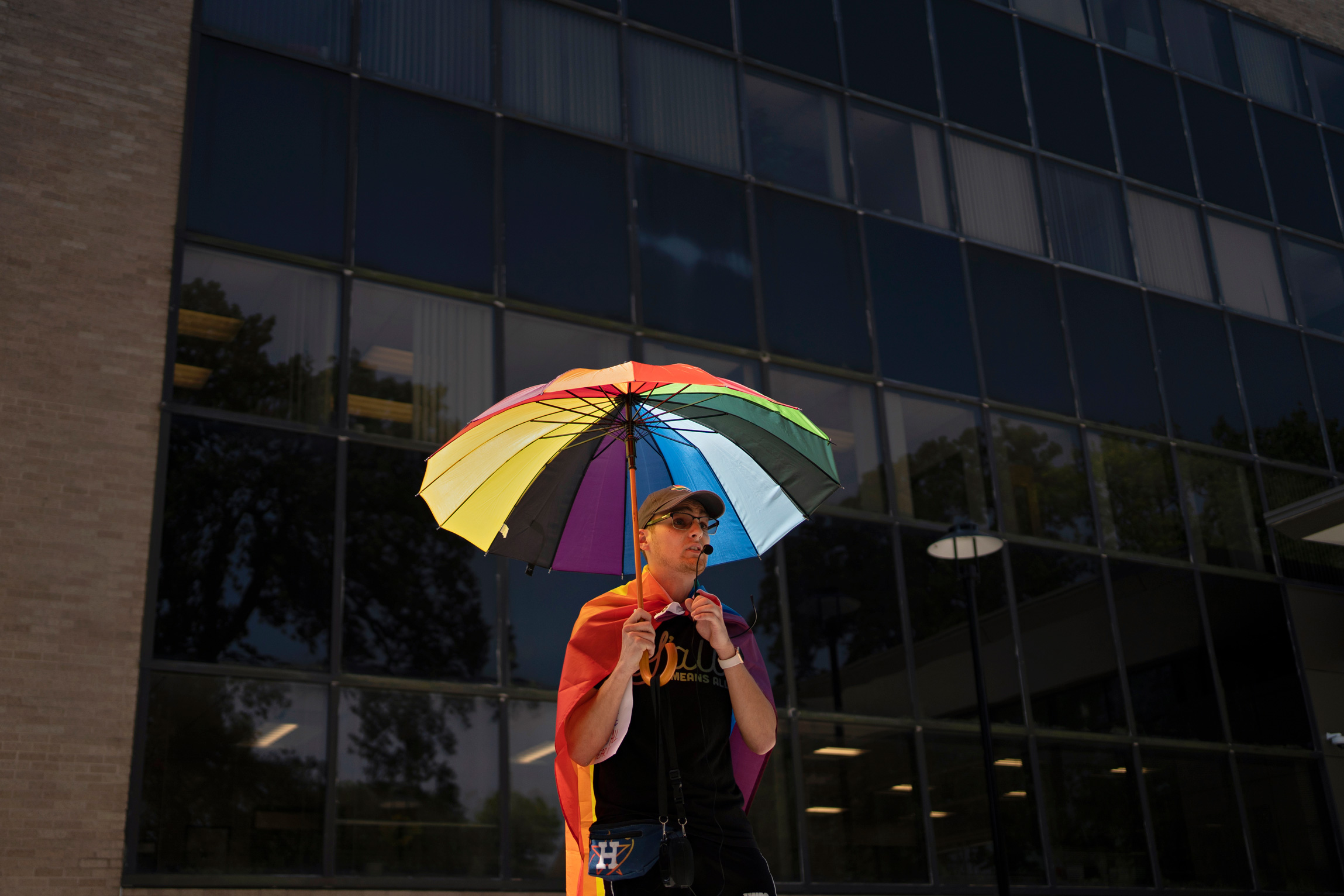|
Getting your Trinity Audio player ready...
|
As Houston approached record-breaking heat Thursday afternoon, University of Houston senior Kaitie Tolman stood confidently in the scorching sun under a rainbow umbrella, leading a crowd of roughly 40 students to protest what they believe is a premature closure of UH’s Center for Diversity and Inclusion and LGBTQ Resource Center.
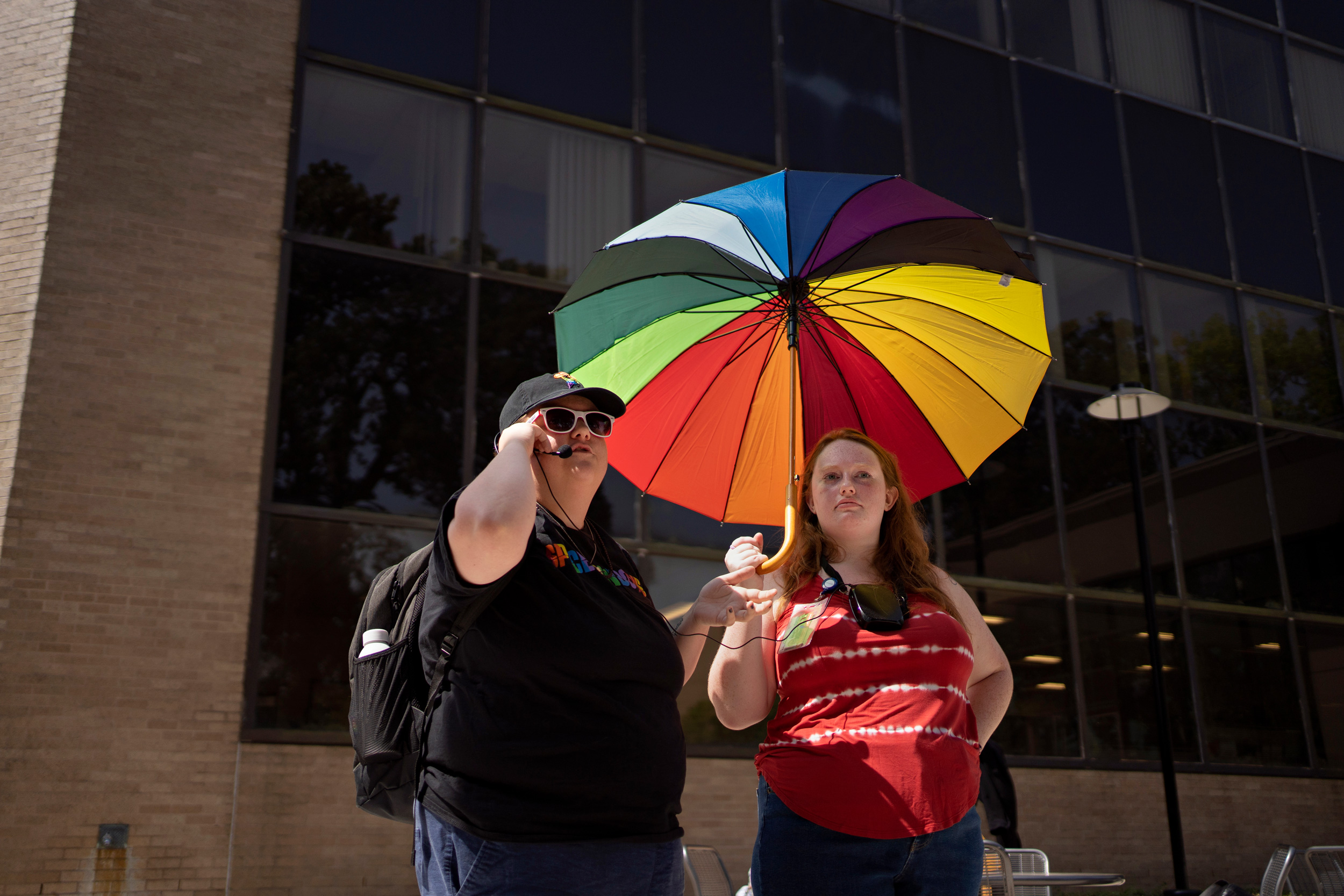
“Bring back the Resource Center! Bring Back CDI! Y’all means all,” Tolman chanted into a headset microphone as the small crowd repeated after her. While the protesters gathered under a tree on the patio of the Graduate College of Social Work, hundreds of UH students rubbernecked the scene as they walked by on their way to the fourth day of class.
UH is closing the two campus centers in response to Texas Senate Bill 17, which will ban “diversity, equity and inclusion” programs at public universities and colleges. The bill has been called the “anti-DEI law.”
Periodically in between chants, Tolman encouraged students to share personal stories and memories, and to speak out on the consequences of the resource centers’ closure. Students shared how they felt safe and found community at the centers; some mentioned meeting their friends or partners there.
Even though the 2023-2024 school year just started, junior Madison Kyle took the day off. “This felt more important,” she said. “I have all semester to go to classes. It’s just one day.”
Closing 5 months before law takes effect
Even though the law does not become effective until Jan. 1, 2024, UH is closing both centers early, on Aug. 31.
A number of Houston-area public colleges and universities affected by the legislation have confirmed to the Landing that SB 17 will force changes to their campuses as well. However, UH is the lone institution to specify an effective closure date of their DEI centers.
“There is no reason to close so early,” said Tolman, who also serves as president of GLOBAL, UH’s student-led LGBTQ group. “Our goal is to at least continue the resource center and for the [Center for Diversity and Inclusion] office to be open as long as possible until they have to close down.” The early closure, she added, does not allow students any transition time to adjust to the changes.
Maria Gonzalez, an associate professor of English who was part of a group of faculty and students that launched the LGBTQ Resource Center in 2010, attended the protest. She criticized the fact that UH is the first Houston-area school to set a closing date for the DEI centers, while other state universities have not done the same. “Everyone else is dragging their heels for good reason,” she said into the microphone. “I don't know why we're taking the lead here.”
“The perfect space”
Some students pointed out how the absence of the centers could hurt the school’s appeal. Nicolas “Nic” Deleon is a junior sociology major and queer studies minor who leads tours on campus and would often point to the LGBTQ Resource Center as an asset UH offered incoming students. “I would always talk about how it was the perfect space for us to go ... It was just a space where a lot of the fights that are in my life can just be left outside the door.”
Now, he’s left without that selling point. “I tell them that the student body here is accepting and you can always find your spaces here within individual groups, but I really was banking off of the LGBTQIA Resource Center,” he said.
“The Resource Center is not just a building on campus,” Tolman said. “The Resource Center is the heart and soul of the LGBTQ community, where all the connections are made.”
Christina Bell, a freshman who said she is biracial but primarily identifies as a Black woman, regularly visited the Center for Diversity and Inclusion. On Thursday, she struggled to put into words her heartbreak and frustration that SB 17 would lead to the closure of the center. “I knew in my heart that this was systemic racism,” she said.
University response
In a statement to the Landing on Thursday, university spokesperson Chris Stripes did not comment on the student organized protest, but said that “while SB 17 does not take effect until Jan. 1, 2024, the University is not permitted to spend money on DEI initiatives after Sept. 1, 2023, due to Section 59 of the General Appropriations Bill.” Section 59 states that state funds cannot be used for “unconstitutional” DEI programs and practices.
Stripes also shared a draft policy with the Landing Wednesday on DEI initiatives and a draft of frequently asked questions, which are under review and open for feedback from the UH community until Sept. 20.
UH students have been bracing for the official announcement of the forthcoming closures ever since a flyer was taped to the door of the center mid-August that read: “In accordance with Texas Senate Bill 17, the LGBTQ Resource Center has been disbanded.” The flyer kicked off a panic among supporters of the center, leading the university to release a statement saying that its posting had been “premature” and “unauthorized.”
Strategically planned to align with the UH Board of Regents meeting held off-campus at the Post Oak Hotel, Thursday marked the first organized protest where students called on the university to delay the closure until the end of the year and devise an action plan to still support minority students.
Supporters of the legislation, such as Houston-area Sen. Brandon Creighton, R-Conroe, who filed the bill, and Lt. Gov. Dan Patrick say DEI practices are “discriminatory” and give special treatment based on race, color and ethnicity rather than merit.
“Texans have some of the best higher educational opportunities available nationwide, right here at home. However, DEI hiring practices have caused division and must be stopped,” Patrick said in an April statement. “Texas universities improve and the educational environment is enhanced when we recruit the best faculty based on merit and equal opportunity, not arbitrary quotas based on equity.”
Opponents of the legislation, including a group of civil rights and education advocacy organizations through the NAACP Legal Defense Fund, argue that SB 17 poses an overall threat to the quality of higher education, and will ultimately hinder school administrators from cultivating a diverse and welcoming campus.
“This legislation threatens to eliminate critical tools still needed to advance educational equity and will negatively impact student outcomes, such as retention and graduation rates for Black students, Latinx students and students from other underrepresented communities,” the group said in a May statement.
UH junior Kyle said going forward, she would like to see an actual plan from the university on how it intends to support the community without these centers.
“The government had no plan when they did this; they just wanted to mess with LGBT people. This was a decision made by out of touch old men who haven’t been to college in like 50 years.”
Correction: A prior version of this story incorrectly identified the UH spokesperson. His name is Chris Stipes.


